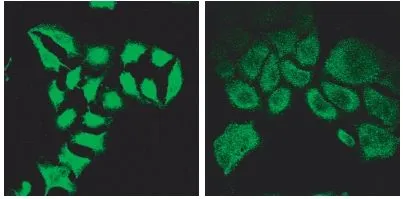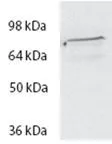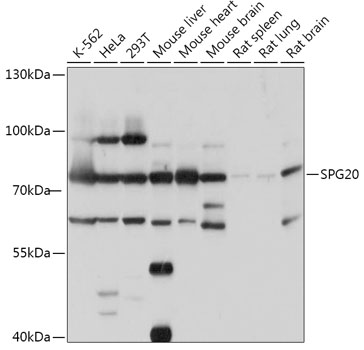
ICC/IF analysis of methanol-fixed HeLa before (left) and after (right) introduction of siRNA using GTX88225 SPARTIN antibody, Internal. Dilution : 2μg/ml
SPARTIN antibody, Internal
GTX88225
ApplicationsImmunoFluorescence, Western Blot, ImmunoCytoChemistry
Product group Antibodies
ReactivityHuman
TargetSPART
Overview
- SupplierGeneTex
- Product NameSPARTIN antibody, Internal
- Delivery Days Customer9
- Application Supplier NoteWB: 1-3microg/ml. *Optimal dilutions/concentrations should be determined by the researcher.Not tested in other applications.
- ApplicationsImmunoFluorescence, Western Blot, ImmunoCytoChemistry
- CertificationResearch Use Only
- ClonalityPolyclonal
- Concentration0.50 mg/ml
- ConjugateUnconjugated
- Gene ID23111
- Target nameSPART
- Target descriptionspartin
- Target synonymsSPG20, TAHCCP1, spartin, spastic paraplegia 20 (Troyer syndrome), trans-activated by hepatitis C virus core protein 1
- HostGoat
- IsotypeIgG
- Protein IDQ8N0X7
- Protein NameSpartin
- Scientific DescriptionThis gene encodes a protein containing a MIT (Microtubule Interacting and Trafficking molecule) domain, and is implicated in regulating endosomal trafficking and mitochondria function. The protein localizes to mitochondria and partially co-localizes with microtubules. Stimulation with epidermal growth factor (EGF) results in protein translocation to the plasma membrane, and the protein functions in the degradation and intracellular trafficking of EGF receptor. Multiple alternatively spliced variants, encoding the same protein, have been identified. Mutations associated with this gene cause autosomal recessive spastic paraplegia 20 (Troyer syndrome). [provided by RefSeq, Nov 2008]
- ReactivityHuman
- Storage Instruction-20°C or -80°C,2°C to 8°C
- UNSPSC12352203







